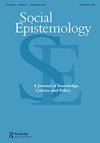如何对抗科学中的语言不公正:公平措施和缓解措施
IF 2
2区 哲学
Q1 HISTORY & PHILOSOPHY OF SCIENCE
引用次数: 1
摘要
摘要尽管科学的通用语言可以让研究人员更容易地交流研究结果,但通用语言的使用也会带来失去多种语言所产生的一些不同想法和结果的代价。继奎因关于翻译不确定性的著名论文之后,我们详细阐述了当只使用一种科学语言时,多样性思想的内在损失。非母语人士有时会因为他们的语言能力而经历认识上的不公正,因此,他们的科学见解被边缘化了。因此,重要的是要在认识论上包括所有研究人员的结果,而不依赖于他们的母语。作为一种解决方案,我们在个人层面和科学界层面促进认识公平和包容。认识公平意味着,因语言技能而处于劣势的研究人员会得到科学界其他成员的支持,这将弥补他们的劣势,同时促进他们的认识包容。这可以通过引入缓解剂来实现——个人和组织应该成为个人研究人员和科学界之间的沟通桥梁。视频摘要阅读文字记录在Vimeo上观看视频©2022 Informa UK Limited,交易名称为Taylor&Francis Group本文章由计算机程序翻译,如有差异,请以英文原文为准。
How to Fight Linguistic Injustice in Science: Equity Measures and Mitigating Agents
ABSTRACT Though a common language of science allows for easier communication of the results among researchers, the use of lingua franca also comes with the cost of losing some of the diverse ideas and results arising from the plurality of languages. Following Quine’s famous thesis about the indeterminacy of translation, we elaborate on the inherent loss of diverse ideas when only one language of science is used. Non-native speakers sometimes experience epistemic injustice due to their language proficiency and consequently, their scientific insights get marginalized. Thus, it is important epistemically to include the results of all researchers independent of their native language. As a solution, we promote epistemic equity and inclusion both on the individual level and on the level of the scientific community. Epistemic equity means that researchers who suffer disadvantages because of their language skills get support from the rest of the scientific community that will compensate for their disadvantage and at the same time facilitate their epistemic inclusion. This can be achieved through the introduction of mitigating agents – the individuals and organizations that ought to serve as a communication bridge between individual researchers and the scientific community. Video Abstract Read the transcript Watch the video on Vimeo © 2022 Informa UK Limited, trading as Taylor & Francis Group
求助全文
通过发布文献求助,成功后即可免费获取论文全文。
去求助
来源期刊

Social Epistemology
Multiple-
CiteScore
2.60
自引率
17.60%
发文量
60
期刊介绍:
Social Epistemology provides a forum for philosophical and social scientific enquiry that incorporates the work of scholars from a variety of disciplines who share a concern with the production, assessment and validation of knowledge. The journal covers both empirical research into the origination and transmission of knowledge and normative considerations which arise as such research is implemented, serving as a guide for directing contemporary knowledge enterprises. Social Epistemology publishes "exchanges" which are the collective product of several contributors and take the form of critical syntheses, open peer commentaries interviews, applications, provocations, reviews and responses
 求助内容:
求助内容: 应助结果提醒方式:
应助结果提醒方式:


